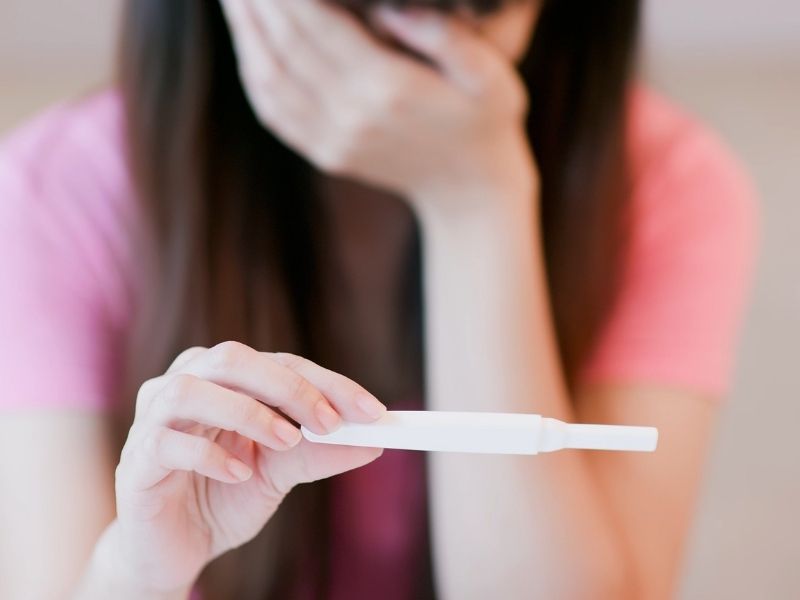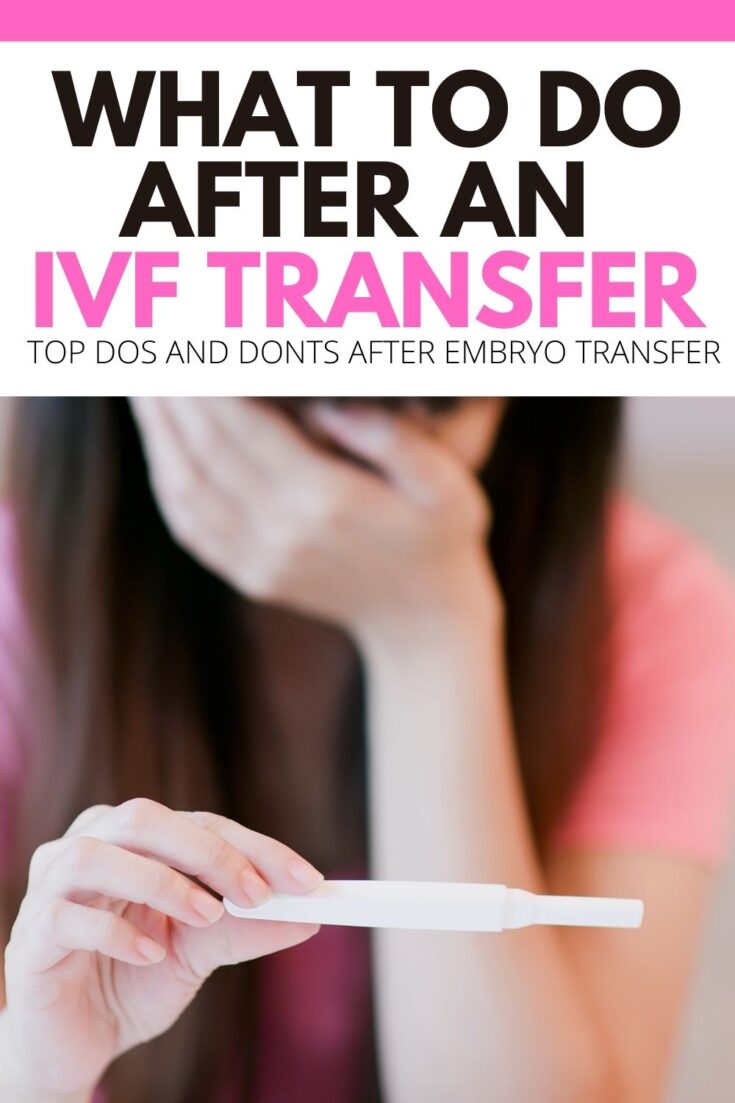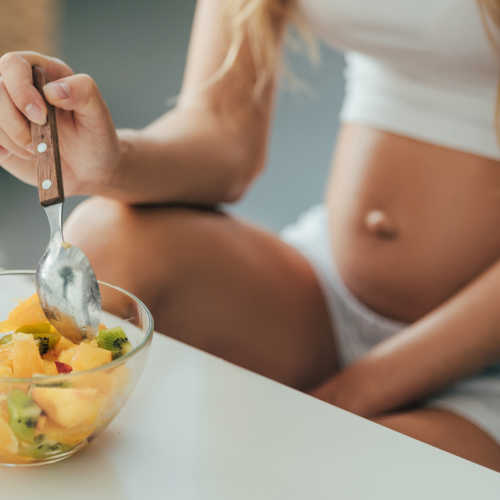Dos and Don’ts for What To Do After an IVF Transfer
It can be hard to know what to do after an IVF transfer. In this blog post we’ll cover the dos and don’ts of what to do after an IVF transfer in order to help improve your odds of success with a healthy pregnancy!
As a parent-to-be, you have probably done a lot of research into the process of IVF.
You’ve probably even read up on what to do after an IVF transfer. But one thing that is often overlooked is what you can do to help ensure you have the best possible chance of a positive pregnancy test after the two week wait.

This post may contain affiliate links. Please read my Disclosure for more information.
RELATED POSTS
Fertility Massage: The Best Way to Increase Egg Quality?
Preparing For IVF – Tips For Success (Free Downloadable Checklist)
Dos and Don’ts for What To Do After an IVF Transfer
In general, many of the dos and don’t for what to do after an embryo transfer are similar to the things you were probably already doing in order to improve your fertility.
Following a healthy fertility diet and reducing your stress levels are just as important after your transfer as before.
What should you do after your IVF transfer?
Take It Easy
Avoid intercourse, heavy lifting and activities that may cause trauma to the pelvis for at least a week following embryo transfer.
That being said, you do not need bedrest after your IVF transfer. In fact, a 2016 Study actually showed that bedrest may negatively impact IVF outcomes.
Don’t take any medications
Do not take any over-the-counter pain medication (ibuprofen or acetaminophen) as this can increase bleeding risk and delay implantation if you conceived.
Eat a healthy diet
Fill your plate with lots of iron rich foods such as leafy greens, beans, lentils, whole grains and lean meats like poultry and fish – these will help promote blood flow in order to build up your uterine lining where an implanted egg would stay before it becomes fertilized.
For a free list of fertility foods that you can take before and after your IVF transfer, you can download my free fertility foods ebook.
[convertkit form=2239065]
Stay Hydrated
Drink plenty of water so thicken cervical mucus which helps sperm travel through the uterus and fallopian tubes to meet the egg.
Some people also recommend drinking something like gatorade to give your body lots of electrolytes after the IVF transfer.
Take Your Prenatal
Take a prenatal vitamin with folic acid which will help support healthy fetal development.
Wear Comfortable Clothing
Wear looser fitting clothing so your uterus can expand as needed for implantation, this is also more comfortable than tight-fitting clothes that restrict blood flow when you are expecting;
Reduce Your Stress Levels
Keep stress low by relaxing in a warm (not hot) bath before bedtime or reading a relaxing book. Here are more tips for How To Relax While Trying To Get Pregnant.
Avoid Caffeine
Just like when you are pregnant, it is best to limit your caffeinated drinks (coffee, tea, diet soda) if caffeine makes it hard for you to relax at night time due to anxiety related symptoms like racing heart rate, irritability or difficulty falling asleep.
Here is a list of the amounts of caffeine in some popular drinks.
Avoid Alcohol
Don’t consume alcohol because it may interfere with the hormone levels that control ovulation which in turn will affect your ability to conceive.
Also, although alcohol doesn’t enter cross the placenta until you are further along in pregnancy, it is not recommended for women undergoing IVF or FET cycles.
How should I sleep after my IVF transfer?
There is no specific sleeping position that has been shown to improve your IVF outcomes although many women feel more comfortable on their back or sides due to the bloating and pressure from the IVF medications.
You want to avoid pressure on your bladder by not laying flat on your back too long following a procedure where sperm are injected into an egg using a catheter or syringe so try to always sleep at least three hours lying on either side before rolling onto your back again.
How long should you rest after embryo transfer?
You should take it easy after embryo transfer for at least a week. This means avoiding heavy lifting, sex and activities that may cause trauma to the pelvis such as going on long walks or dancing.
It’s important not to overdo it after IVF so you don’t risk creating more problems than what is already there from your condition – this includes uterine scarring if you have endometriosis or pelvic adhesions which can lead to infertility issues in the future!
IVF success rates are highest when patients rest their bodies during treatment; studies show an increase of pregnancy rates by 48% among those who rested for two weeks following embryo transfer compared with those who did not rest post-transfer !!!
It’s best to follow the recommendations of your doctor or nurse when it comes to what you should do after an IVF transfer.
Is it safe to walk after embryo transfer?
Walking may be done after one day but should be limited to gentle movements around the house or just outside of your home if you are able to walk without putting too much stress on your body.
It’s best not to engage in any physical activity that could cause trauma (such as long walks) when there is an increased risk of bleeding afterwards – this includes sexual intercourse and vigorous sports like running which can also increase pelvic pain symptoms !!!
Can I bend down after an Embryo Transfer?
Although some IVF clinics prescribe bedrest after an IVF transfer, bear in mind that nothing you do will drastically change the chances of your embryo implanting or not.
After all, consider all the people who get pregnant while running races or doing hard physical jobs.
That being said, one reason to take it easy after your FET or fresh IVF cycle is because of the pressure in your abdomen. Don’t overdo it with housework or hard labor for the first few days at least.
Frozen Embryo Transfer Tips
The tips for improving the outcomes of your frozen embryo transfer (FET) are pretty much the same as after a fresh IVF cycle.
FET success rates are highest when patients follow these guidelines:
– Get enough rest – try not to nap during the day if possible
– Monitor stress – reduce or eliminate any activities that may cause you anxiety (foods high in caffeine such as coffee, tea or diet soda)
– Protect your uterus with movement exercises including yoga or gentle walking at a slow pace (<less than two miles per hour).
Positive Signs After Embryo Transfer
Remember that you won’t get any pregnancy symptoms right after your IVF procedure.
However, if you are experiencing these symptoms, it’s possible that an embryo has implanted:
– Slight bleeding or spotting – You might have some light menstrual flow which is normal as the uterus prepares for implantation of the fertilized egg !!!
– Mild cramping in lower abdomen/pelvic region (due to pressure on pelvic organs from swelling)
– Heat sensations that feel like warm water running through veins in pelvis and thighs – caused by hormone changes during pregnancy! They tend to occur at night but again this can start any time. It’s usually one side more than another depending upon where the embryo attaches inside of the uterine wall
For more early pregnancy signs that could indicate your embryo transfer has been a success, make sure to read my list of 70 Early Signs Of Pregnancy (The Weird And Unusual!)
What To Do After An IVF Transfer – Final Thoughts
If you’re looking for tips on what to do when you wake up after an IVF transfer, we hope you found the information in this article helpful.
Eating and sleeping well are important for overall health, but they’re also important when you’re preparing to undergo a fertility treatment like in vitro fertilization (IVF).
If you do have a positive outcome, make sure to refer to the following posts for more tips:
The Joys & Anxieties of Pregnancy After Infertility
43 Pregnancy Quotes And Parenting Advice For Expecting Moms
25 Ways To Announce A Pregnancy To Family In Person








It’s hard for you to relax at night time due to anxiety related symptoms like racing heart rate, irritability or difficulty falling asleep this information was very useful .santhathi is one of the best ivf fertility hospital in bangalore.